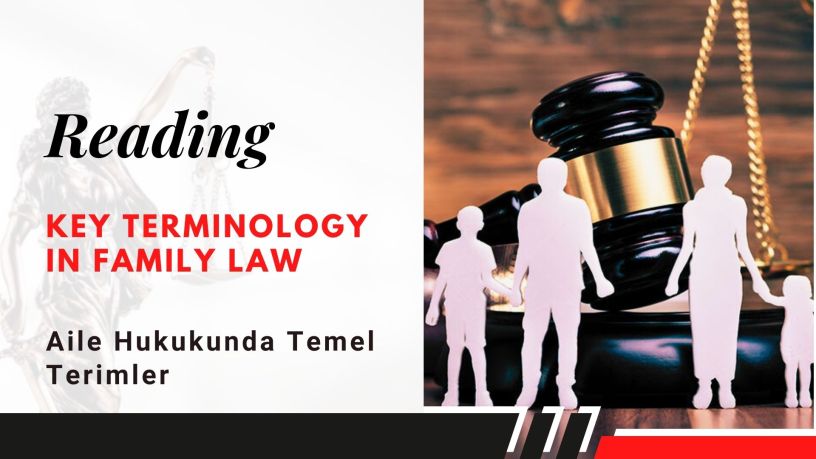Aile hukuku; evlilik, boşanma, çocuk velayeti, evlat edinme ve aile içi şiddet gibi ailevi ilişkilerle ilgili geniş bir yasal konu yelpazesini kapsar. Aile hukuku alanında kullanılan temel terimleri anlamak, hukuk profesyonelleri, öğrenciler ve aile hukuku konularında yer alan bireyler için son derece önemlidir. Bu bölümde, aile hukuku alanında sıkça karşılaşılan ve tanımlanması gereken temel Hukuk İngilizcesi terimlerini keşfedeceğiz.
Yazımızın sonunda 8 soruluk bir Mini Test ile öğrendiklerinizi pekiştirme fırsatı bulacaksınız !
İyi Çalışmalar…
Introduction
Family law encompasses a broad range of legal issues related to familial relationships, including marriage, divorce, child custody, adoption, and domestic violence. Understanding the key terminology used in family law is crucial for legal professionals, students, and individuals involved in family law matters. In this chapter, we will explore and define essential legal English terminology commonly encountered in the field of family law.
Marriage and Divorce Terminology:
Spouse (Eş): A person who is legally married to another individual.
Annulment (Evliliğin Butlanı): The legal process that declares a marriage null and void, as if it never occurred.
Divorce (Boşanma): The legal termination of a marriage or civil partnership.
Alimony/Maintenance (Nafaka): Financial support paid by one spouse to the other following a divorce or separation.
Property Division (Mal Paylaşımı): The division of assets and debts acquired during the marriage upon divorce or separation.
Child Custody and Support Terminology:
Custody (Velayet): The legal right and responsibility to care for and make decisions about a child’s upbringing.
Joint Custody (Müşterek Velayet): When both parents share the responsibility and decision-making authority for the child.
Sole Custody (Tek Başına Velayet): When one parent has exclusive custody and control over the child.
Visitation/Access (Çocuk ile Şahsi İlişki): The right of a non-custodial parent to spend time with the child.
Child Support (İştirak Nafakası): Financial assistance paid by one parent to the other to provide for the child’s needs.
Adoption Terminology:
Adoption (Evlat Edinme): The legal process through which an individual or couple becomes the legal parent(s) of a child who is not biologically their own.
Birth Parent (Biyolojik Ebeveyn): The biological parent(s) of a child who is being placed for adoption.
Adoptive Parent (Evlat Edinen): The individual or couple who legally assumes the parental rights and responsibilities of a child through adoption.
Termination of Parental Rights (Velayetin Kaldırılması): The legal process by which a parent’s rights and obligations toward their child are permanently ended.
Domestic Violence Terminology:
Domestic Violence (Aile içi Şiddet): Abuse or violence between individuals who are or have been in a close relationship, such as spouses, cohabiting partners, or family members.
Restraining Order/Protective Order (Kısıtlama Kararı – Önleyici Tedbir): A court order that prohibits an individual from contacting or coming near another person who has been a victim of domestic violence.
Battering (Fiziksel Şiddet): The repetitive use of physical violence against an intimate partner or family member.
Conclusion:
Familiarity with the key terminology in family law is essential for navigating the complexities of legal matters related to marriage, divorce, child custody, adoption, and domestic violence. By understanding these terms, legal professionals and individuals involved in family law cases can communicate effectively and work towards achieving fair and just outcomes.
Vocabulary Mini Test: Family Law Terminology
Instructions: Select the correct definition for each of the following family law terms.
1.Alimony/Maintenance:
a) The legal termination of a marriage or civil partnership.
b) Financial support paid by one spouse to the other following a divorce or separation.
2. Termination of Parental Rights:
a) The legal process that declares a marriage null and void.
b) The legal process by which a parent’s rights and obligations toward their child are permanently ended.
3. Domestic Violence:
a) Abuse or violence between individuals who are or have been in a close relationship.
b) Financial assistance paid by one parent to the other for the child’s needs.
4.Annulment:
a) The legal right and responsibility to care for and make decisions about a child’s upbringing.
b) The legal process that declares a marriage null and void, as if it never occurred.
5.Joint Custody:
a) The right of a non-custodial parent to spend time with the child.
b) When both parents share the responsibility and decision-making authority for the child.
6.Adoption:
a) The legal process through which an individual or couple becomes the legal parent(s) of a child who is not biologically their own.
b) The legal process by which a parent’s rights and obligations toward their child are permanently ended.
7.Restraining Order/Protective Order:
a) A court order that prohibits an individual from contacting or coming near another person who has been a victim of domestic violence.
b) The division of assets and debts acquired during the marriage upon divorce or separation.
8.Custody:
a) The legal termination of a marriage or civil partnership.
b) The legal right and responsibility to care for and make decisions about a child’s upbringing.
Answers:
- b) Financial support paid by one spouse to the other following a divorce or separation.
- b) The legal process by which a parent’s rights and obligations toward their child are permanently ended.
- a) Abuse or violence between individuals who are or have been in a close relationship.
- b) The legal process that declares a marriage null and void, as if it never occurred.
- b) When both parents share the responsibility and decision-making authority for the child.
- a) The legal process through which an individual or couple becomes the legal parent(s) of a child who is not biologically their own.
- a) A court order that prohibits an individual from contacting or coming near another person who has been a victim of domestic violence.
- b) The legal right and responsibility to care for and make decisions about a child’s upbringing.

FAYDALI OLMASI DİLEKLERİMİZLE
KATKI, GÖRÜŞ, ELEŞTİRİ VE SORULARINIZI BİZE YORUM OLARAK YAZABİLİRSİNİZ.

 Bu eser Creative Commons Atıf-GayriTicari-AynıLisanslaPaylaş 4.0 Uluslararası Lisansı ile lisanslanmıştır.
Bu eser Creative Commons Atıf-GayriTicari-AynıLisanslaPaylaş 4.0 Uluslararası Lisansı ile lisanslanmıştır.

